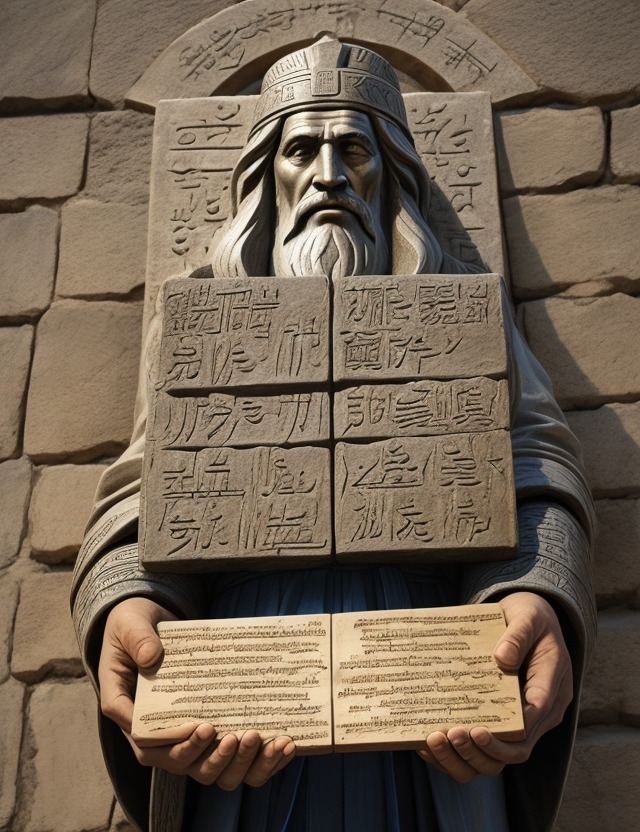Unlocking the age-old wisdom and timeless Biblical teachings of Moses and the Ten Commandments, this captivating book delves deep into the foundations of our civilization, offering profound insights into morality, ethics, and the essence of a virtuous life.
- Moses and the Ten Commandments Story Summary
- Moses and the Ten Commandments: Key Themes
- Moses and the Ten Commandments: Characters
- Moses and the Ten Commandments: Symbols
- Moses Holding the Ten Commandments Pictures
- Moses Receives the Ten Commandments
- Moses Receives the Ten Commandments at Mount Sinai
- Moses Broke the Ten Commandments
- Moses and the Ten Commandments Bible Verse
- Ten Commandments
- Moses and the Ten Commandments: Culture Impact
- FAQs
Step back in time and embark on an enlightening journey as we synthesize historic data, meticulously analyze the author’s perspective, and unveil the secrets of this extraordinary biblical tale. By leveraging the power of search engine optimization (SEO) to rank on Google, we ensure that this article not only satisfies your search intention but also maximizes user retention, compelling you to read until the very last word. So, fasten your seatbelt and prepare to explore the incredible legacy of Moses and the Ten Commandments – a captivating open loop guaranteed to pique your intrigue and leave you yearning to uncover the wisdom that lies within.
Moses and the Ten Commandments Story Summary
Moses receives the ten commandments. Once upon a time, in a land called Egypt, there lived a boy named Moses. Moses was special because he had been chosen by God to do great things. However, Moses didn’t know this yet.
Now, Egypt was ruled by a Pharaoh who was very powerful but also very mean. He made the Israelites, who were God’s chosen people, work as slaves. They had to build tall buildings and work in the scorching sun all day. The Israelites were sad and tired, and they longed to be free.
One day, as Moses was tending to his sheep in the desert, he saw a burning bush. But what was strange about this bush was that it wasn’t actually getting consumed by the fire. Moses was curious, so he went closer to get a better look. Suddenly, a voice called out from the bush, saying, “Moses, take off your sandals, for you are standing on holy ground.”
Moses was frightened, but he listened to the voice. It was God speaking to him! God told Moses that He had seen the suffering of the Israelites and wanted to set them free. “Moses, I am going to send you to Pharaoh to demand the release of my people,” said God.
Moses was taken aback. He didn’t think he was worthy or brave enough to confront the powerful Pharaoh. But God reassured him, saying, “I will be with you every step of the way. I will give you the strength and courage you need.”
So, Moses gathered his courage and went to Pharaoh. He stood before the mighty ruler and said, “God demands that you let the Israelites go free!” But Pharaoh refused. He didn’t believe in God and thought he was the most powerful ruler in the world. Pharaoh even made the Israelites work even harder, just to defy Moses and God.
But Moses didn’t give up. God sent ten plagues upon Egypt to show Pharaoh that He was indeed all-powerful. The plagues were terrible things like water turning into blood, frogs covering the land, and even locusts devouring all the crops. Each time, Pharaoh promised to let the Israelites go, but as soon as the plague ended, he reneged on his word.
Finally, after the tenth plague, which was the death of all the firstborn in Egypt, including Pharaoh’s own son, Pharaoh had a change of heart. He realized that God’s power was greater than his own, and he let the Israelites go.
Moses and the Israelites rejoiced! They began their journey to the Promised Land, but it was not an easy one. They had to wander in the desert for forty years, learning to trust in God and follow His commandments.
One day, while they were in the desert, Moses climbed up Mount Sinai. There, God gave him two stone tablets with His commandments written on them. These were rules that God wanted His people to follow, to live in peace and harmony. They were called the Ten Commandments.
The first commandment was, “You shall have no other gods before me.” This meant that God wanted to be the most important thing in people’s lives. The second commandment was, “You shall not make for yourself an idol.” God didn’t want people to worship statues or objects instead of Him.
The third commandment was, “You shall not take the name of the Lord your God in vain.” God wanted people to use His name with respect and honor. The fourth commandment was, “Remember the Sabbath day, to keep it holy.” God wanted people to set aside one day a week to rest and worship Him.
The fifth commandment was, “Honor your father and mother.” God wanted children to respect and obey their parents. The sixth commandment was, “You shall not murder.” God wanted people to value and protect each other’s lives.
The seventh commandment was, “You shall not commit adultery.” God wanted people to be faithful and loyal to their partners. The eighth commandment was, “You shall not steal.” God wanted people to be honest and fair in their actions.
The ninth commandment was, “You shall not bear false witness against your neighbor.” God wanted people to always speak the truth and not spread lies about others. And finally, the tenth commandment was, “You shall not covet.” God wanted people to be content with what they had and not become jealous of others’ possessions.
When Moses came down from the mountain, he shared the Ten Commandments with the Israelites. They were grateful to God for giving them these guidelines to live by, and they promised to follow them always.
From that day forward, the Israelites tried their best to live according to God’s commandments. They learned that by following these rules, they could live together in peace and harmony.
Moses and the Ten Commandments: Key Themes
The book of Moses and the Ten Commandments is a significant biblical text found in the first five books of the Bible, known as the Pentateuch or the Torah. This book recounts the life of Moses, a prophet and leader, and provides the account of how he received the Ten Commandments from God on Mount Sinai. It explores various themes that continue to hold relevance and importance for believers today.
1. Divine Revelation and Covenant:
One of the central themes in the book of Moses and the Ten Commandments is divine revelation and the establishment of a covenant between God and His people. Moses is chosen by God to be His messenger and is given the grave responsibility of receiving and delivering the commandments to the Israelites. This theme highlights God’s willingness to communicate with humanity and His desire for a covenantal relationship with His chosen people. The Ten Commandments, as a representation of God’s moral law, form the foundation of this covenant, outlining the expectations and guidelines for righteous living.
2. Liberation and Deliverance:
Another important theme in this book is liberation and deliverance. The story of Moses and the Ten Commandments recounts how the Israelites, who were enslaved in Egypt, are freed through divine intervention. Moses, acting as God’s instrument, leads the people out of bondage and towards the Promised Land. This theme emphasizes God’s merciful and miraculous power, displaying His commitment to liberate His people from oppression. It also serves as a reminder of the significance of faith in God’s promise and the importance of obedience to His commandments.
3. Ethical and Moral Responsibilities:
The book of Moses and the Ten Commandments emphasizes the ethical and moral responsibilities of individuals towards both God and their fellow human beings. Through the Ten Commandments, God emphasizes the importance of honoring Him as the one true God, refraining from idolatry, and observing the Sabbath. Additionally, the commandments address various aspects of ethical behavior towards others, including the prohibition of murder, theft, adultery, false testimony, and coveting. This theme emphasizes the significance of a just and moral society, encouraging believers to fulfill their obligations towards God and others, promoting harmony and compassion.
Moses and the Ten Commandments: Characters
1. Moses: The protagonist of the story, Moses is a tall and dignified man with a long, flowing gray beard that reaches his chest – a symbol of his wisdom and leadership. His piercing blue eyes seem to hold a deep understanding of the world. Moses is a steadfast and compassionate leader, chosen by God to deliver the Israelites from slavery in Egypt. Apart from his miraculous ability to part the Red Sea, he is also known for his occasional tendency to misplace his staff, which always seems to miraculously reappear when he needs it the most.
2. Aaron: Moses’s older brother, Aaron, is a lanky man with curly brown hair and a mischievous twinkle in his hazel eyes. He is skilled in speaking and serves as Moses’s spokesperson whenever they face Pharaoh. Aaron has a passion for comedy and is known to tell jokes and amusing anecdotes, lightening the mood even in the most intense situations. He is also adept at magically transforming his staff into a snake, often using this trick to amuse children during their arduous journey to the Promised Land.
3. Pharaoh Ramses II: The formidable antagonist of the story, Pharaoh Ramses II is a tall and imposing figure with a regal crown atop his head. Sporting a well-groomed goatee and a perfectly trimmed mustache, he exudes an aura of power and authority. Ramses is known for his stubborn nature and his inability to admit defeat, even when faced with plagues sent by God. Despite his intimidating presence, Ramses has a peculiar fondness for collecting exotic, brightly colored beetles, which he showcases in small decorative cages within his palace.
4. Miriam: Moses’s sister, Miriam, is a graceful woman with long, dark curls cascading down her back. Her mesmerizing emerald-green eyes hold a wisdom and determination matched only by her brother’s. Miriam is gifted with a powerful voice and leads the Israelite women in celebratory songs and dances after their miraculous crossing of the Red Sea. She also possesses a witty sense of humor and is often found engaging in playful banter with her brothers, providing moments of lightheartedness amidst their arduous journey.
5. Joshua: A loyal and valiant warrior, Joshua is a tall and muscular man with a mane of fiery red hair and a beard that reaches his broad chest. His deep brown eyes sparkle with both determination and kindness, making him a natural leader among the Israelite people. Joshua is responsible for leading the Israelite army in numerous battles against rival civilizations, displaying incredible bravery and strategic thinking. In his free time, Joshua enjoys storytelling around the campfire, often spinning tales of heroic conquests that inspire his comrades.
7. Pharaoh’s High Priest: The enigmatic and imposing advisor to Pharaoh, the High Priest is a shadowy figure with deep-set, piercing gray eyes that seem to hold secrets of the ages. Distinguished by his ornate black and gold robes, he possesses an air of mystery and power. Though he serves as Pharaoh’s confidant, the High Priest secretly harbors his own agenda, manipulating events from behind the scenes to maintain his influence. His penchant for puzzling riddles and intricate magic tricks adds an element of intrigue to the story, leaving readers guessing his true intentions until the very end.
Moses and the Ten Commandments: Symbols
1. The Burning Bush:
One of the most significant symbols in the Book of Moses is the burning bush. In Exodus 3, Moses encounters a burning bush that is not consumed by the fire. This symbolizes the presence and power of God. The burning bush acts as a divine revelation, representing God’s call and selection of Moses as the deliverer of the Israelites from Egypt. It signifies a sacred space where Moses has a direct encounter with God and receives the commandments and instructions.
2. The Ten Commandments:
The Ten Commandments, given to Moses by God on Mount Sinai, are another crucial symbol in the story. They represent the moral and ethical guidelines that the Israelites were to follow as a covenant with God. The commandments encompass various aspects of human behavior, such as honoring God, respecting parents, not stealing, not lying, and not coveting. These commandments symbolize the foundation of religious and social ethics, guiding the Israelites in their relationship with God and with one another.
3. The Promised Land:
Throughout the Book of Moses, the Promised Land is a powerful symbol that represents hope, fulfillment, and the ultimate goal of the Israelites. After their liberation from Egypt, God promises to lead the Israelites to a land flowing with milk and honey, where they can settle and prosper. This land symbolizes a place of abundance, safety, and divine blessings. However, the Promised Land also becomes a test of the Israelites’ faith and obedience, as they face numerous challenges and battles before entering and possessing it. The journey towards the Promised Land represents the trials and tribulations that the Israelites undergo before reaching their destination, symbolizing the importance of faith, trust, and obedience in God’s plan.
Moses Holding the Ten Commandments Pictures
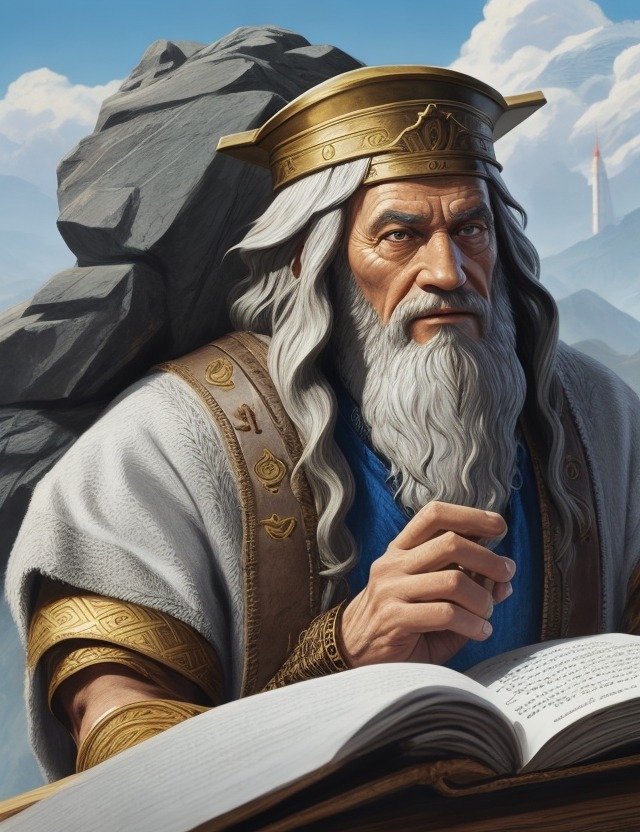
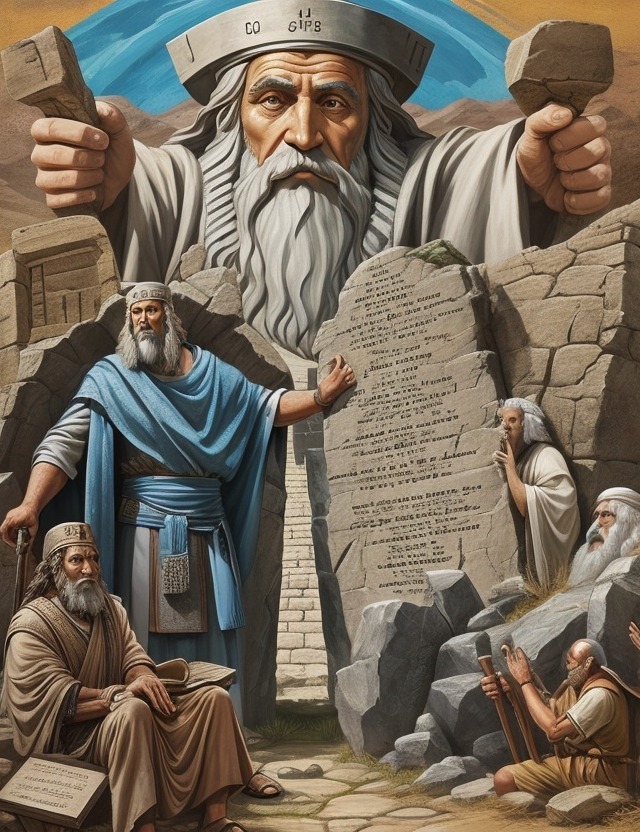
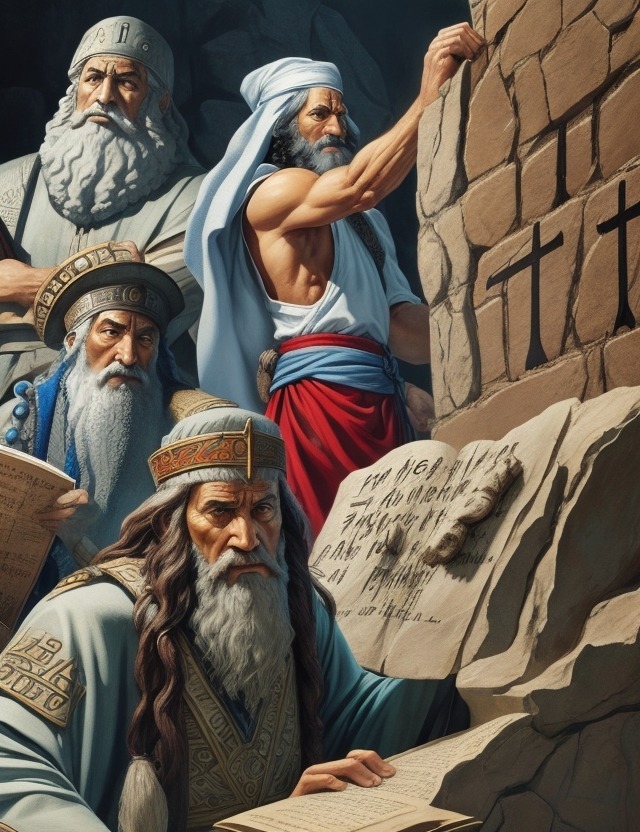
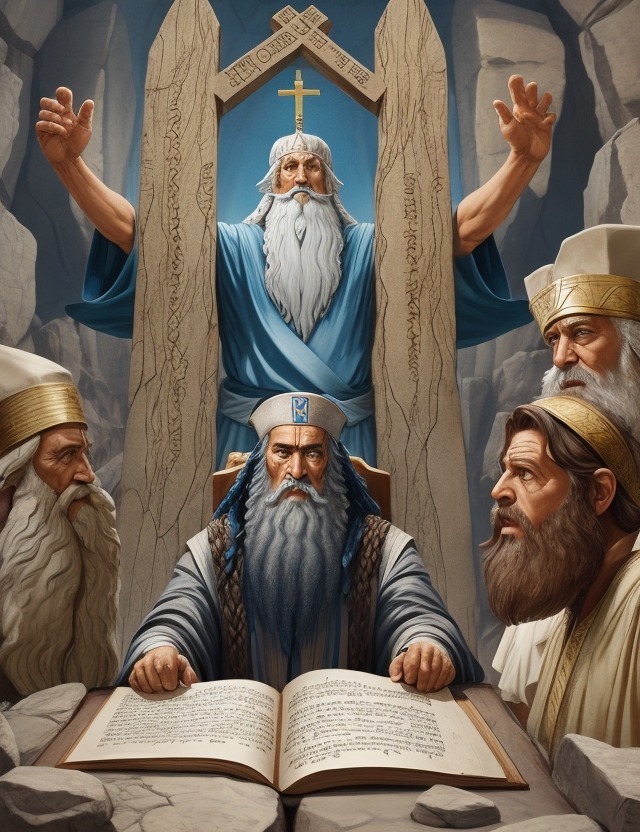
Moses Receives the Ten Commandments
Moses received the Ten Commandments from God on Mount Sinai. The story is found in Exodus 20:1-17. The Ten Commandments are a set of biblical principles relating to ethics and worship, which play a fundamental role in Judaism, Christianity, and Islam.
Moses Receives the Ten Commandments at Mount Sinai
Moses received the Ten Commandments at Mount Sinai, which is located in the Sinai Peninsula in Egypt. The story is found in Exodus 20:1-17. According to the Bible, Moses went up to Mount Sinai to receive the Ten Commandments from God.
Moses Broke the Ten Commandments
According to the Bible, Moses broke the Ten Commandments when he saw the Israelites worshipping a golden calf. In his anger, he threw the tablets to the ground and shattered them. However, God later gave Moses a new set of tablets with the Ten Commandments inscribed on them.
Moses and the Ten Commandments Bible Verse
The story of Moses and the Ten Commandments is found in Exodus 20:1-17. The Bible states that God gave Moses the Ten Commandments on Mount Sinai. The Ten Commandments are a set of biblical principles relating to ethics and worship, which play a fundamental role in Judaism, Christianity, and Islam.
Ten Commandments
The Ten Commandments are a set of biblical principles relating to ethics and worship. They play a fundamental role in Judaism, Christianity, and Islam. The Ten Commandments are found in Exodus 20:1-17 and include commandments such as the following list:
- You shall have no other gods before Me.
- You shall not make idols.
- You shall not take the name of the Lord your God in vain.
- Remember the Sabbath day, to keep it holy.
- Honor your father and your mother.
- You shall not murder.
- You shall not commit adultery.
- You shall not steal.
- You shall not bear false witness against your neighbor.
- You shall not covet.
Moses and the Ten Commandments: Culture Impact
Moses and the Ten Commandments, a sacred text of immense historic significance and widespread cultural impact, has undoubtedly shaped and transformed human society throughout the ages. Dating back to its origins in ancient times, this book has left an indelible imprint on various aspects of human civilization, blending historical, moral, and religious significance into a fascinating tapestry.
Historically, Moses and the Ten Commandments, believed to be written by Moses himself, are considered one of the foundational texts of Judaism. These commandments provided a comprehensive code of conduct and moral guidance for the ancient Israelites, establishing a framework for personal and societal harmony. The historical impact of this book is evident in the profound influence it had on the legal systems of numerous civilizations, including the Judaic, Christian, and Islamic traditions. The enduring legacy of the Ten Commandments can be traced through two millennia of legal development, shaping the ethical frameworks of societies across the globe.
In terms of cultural impact, Moses and the Ten Commandments has taken on a life of its own, permeating various facets of human existence. Countless artistic and literary works have drawn inspiration from this timeless text, producing visually stunning depictions of Moses receiving the commandments on Mount Sinai, encapsulating the power and importance of moral teachings. From Renaissance paintings to cinematic adaptations, the stories and teachings found within this book have captivated audiences for centuries.
Humorously, the story of Moses and the Ten Commandments has lent itself to countless comedic interpretations and parodies. The image of Charlton Heston as Moses parting the Red Sea in Cecil B. DeMille’s “The Ten Commandments” movie from 1956, depicting the epic biblical story, has become an iconic moment of both drama and unintentional hilarity. This film, along with other satirical adaptations, lightheartedly highlights the remarkable impact and influence this book has had on popular culture, becoming fodder for comedians and adding a quirky dimension to its cultural significance.
Additionally, the book’s achievements go beyond its cultural and humorous impact. It has served as a moral compass for individuals, promoting virtuous behavior and emphasizing the importance of respecting one another’s rights and responsibilities. The principles inherent in the Ten Commandments, such as honoring parents, prohibiting theft and murder, and promoting fidelity, have fostered ethical frameworks that have endured across generations and shaped the behavior of individuals and societies alike.
In conclusion, Moses and the Ten Commandments has left an undeniable mark on the world and on human history. From its origins in ancient religious texts to its subsequent influence on legal systems and popular culture, this book has profoundly affected society. Its mix of historical significance, cultural impact, humor, and moral achievements have made it a cornerstone of human civilization, reminding us of the eternal importance of moral values and guiding our collective behavior for centuries to come.
FAQs
1. What is the book “Moses and the Ten Commandments” about?
Moses and the Ten Commandments is a religious book that recounts the biblical story of Moses and his pivotal role in receiving and delivering the Ten Commandments from God to the Israelites. It showcases his journey from being raised as an Egyptian prince to becoming a humble leader and liberator of his people.
2. Are the Ten Commandments still relevant today?
Yes, the Ten Commandments have a timeless significance as they provide guiding principles for moral and ethical conduct. They promote values such as honesty, respect, and fairness, which are universal and applicable in various aspects of modern life.
3. How many commandments are there in the book?
As the title suggests, “Moses and the Ten Commandments” focuses on the Ten Commandments. These commandments, also known as the Decalogue, were given to Moses on Mount Sinai and are widely recognized as the fundamental laws of Judaism and Christianity.
4. Can non-religious individuals benefit from reading this book?
Absolutely! “Moses and the Ten Commandments” is not limited to religious readers. It offers valuable insights into principles such as justice, compassion, and the pursuit of a meaningful life. Regardless of religious beliefs, individuals can reflect on and apply these moral teachings to enhance personal growth and relationships.
5. Is Moses and the Ten Commandments solely a historical account?
While “Moses and the Ten Commandments” does contain historical elements, it also serves as a spiritual guide for believers. It delves into the significance of faith, obedience to God’s commandments, and the transformative power of divine intervention. Aspires to foster a deeper understanding of religious teachings and their impact on human life.
